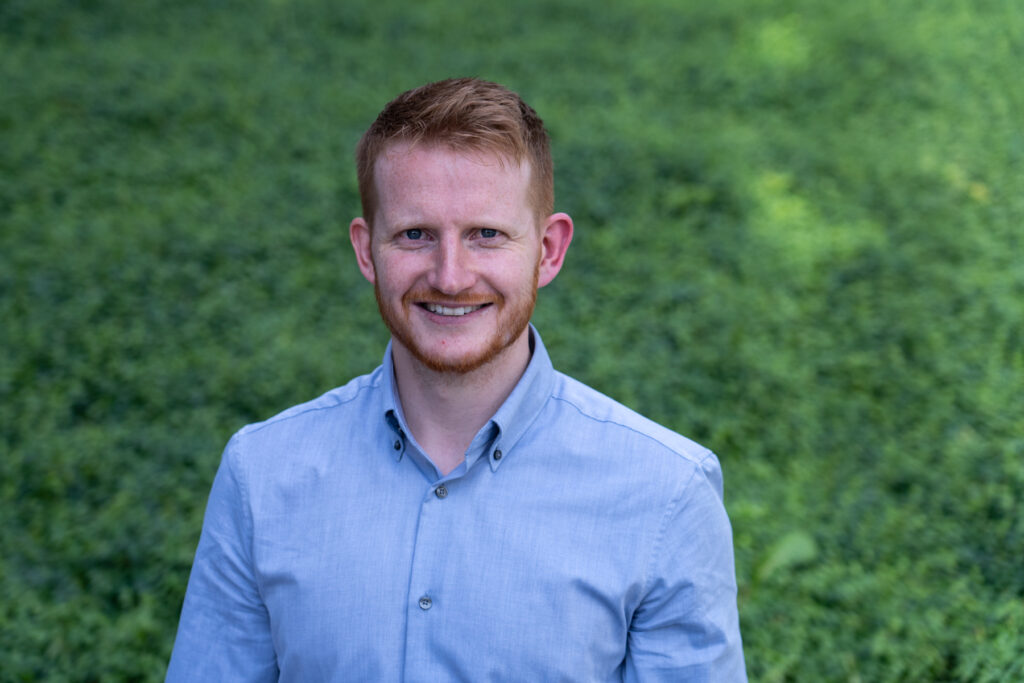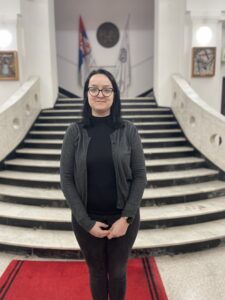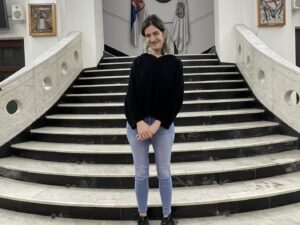Interview at end of the journey with Rhys Hellin, Welsh Water
July 2021
Hands-on experience for development has always been more interesting to me than classroom learning. I began my civil engineering career in a work-study arrangement. My first post was supporting a project manager looking after contract elements, then into project management – until an opportunity came up in 2013 with Dwr Cymru Welsh Water (DCWW) for a position in wastewater networks contracts team. In the past two years, I’ve been working on a dam safety program and how businesses are investing in the future. We have a number of reservoirs in Wales that need investment to ensure their function for the coming years. Many of our risk concerns are driven by climate impacts and their impacts on local situations.
I saw participating in EJWP as a good opportunity for me to expand knowledge and make new connections in the water sector. This was important, because all my experience to that point was based in Wales, without experience in what the water industry looked like in other countries. On a project level, it’s easy to miss exploring broader aspects of the sector, so experiencing this program first-hand is quite valuable to me. My work duties have not been lightened during the course, and it’s been a manageable balance with the time required for EJWP, which has been overall beneficial for me personally.
Meeting the other participants in the project is one of the most valuable things about EJWP. We’re in touch a couple of days every week and meet every quarter, sharing perspectives on relevant work for water companies. This has been an eye-opener because others look at the policy aspects of water, and the drivers and challenges behind the legislation. This has taken me outside of what I do in providing clean water and treatment of waste water, to see challenges and applications in agriculture, industry and energy including hydro power. I have learned a lot through seeing how others operate.
I can connect local expertise with other regional needs through a Wales-based perspective. The geography in Wales can be an advantage, so we can position our strengths of water storage to help other countries with their water shortages. I saw this in a project we did on looking at the future water impacts on individual countries and how they could evolve in extreme ways, like responses to maximum scenarios. We really had to think out of the box, and this is particularly significant because water companies can be slow to change their methods. My EJWP colleagues and I prepared a presentation on possible conditions through different regions, considering the issues through a magnified lens. Each participant brought in their approach based on their point of reference to reach an understanding through a broader perspective.
I would like to see EJWP projects that focus over a longer period to test successful approaches in bringing about longer-term change. I think participants have the ambition to make more positive changes in the European water sector – to take action to the next level onto policy and more. EJWP is taking people with a real enthusiasm to make a difference in the water sector, and giving them the tools to go as far as they can.
EJWP is the best platform I’ve seen on a European scale, because it motivates ambitious young water pros to keep their expertise and energy in the sector. It smartly supports human capital in the water sector for them to thrive, instead of hitting barriers and moving to other sectors. If I were CEO of an upcoming company, I would use EJWP to drive the right connections and feedback from the sector.
I’ve seen a real commitment from EJWP to continuing to put its unique value in online forums of the program during the pandemic, and not abandon the connections and achievements that we’ve made in past year. Covid has of course been a major challenge on the global scale, and also in EJWP because we’ve missed live connections in our last four meetings. For me, the projects can be more challenging to perform online, but that is part of adapting to new realities as they come. We’re striving for the same connections on screen and seeing some of the same benefits.
An ideal water sector would be much more collaborative – beyond project specifics and localized practices. We need broader connections for solutions that already exist to problems that we’re individually working on. It’s really not rocket science, but interactive programs, especially for young professionals, help bridge this gap. The technology is there in many cases to support solutions, I think here we’re creating connections for the right kind of implementation.
Climate adaptation will drive the way we operate in the future, because flood and droughts due to climate impacts are only starting to take their toll on people and infrastructure. New ways of managing water and better resilience are key. Many good ideas are ready to be tapped in the minds of young water professionals who will also be impacted by these climate issues. It’s up to us to make our own world more liveable through better collaboration on water issues that affect us all!
Introduction of Rhys at the start of EJWP
June 2019
Rhys is a Dwr Cymru, Welsh Water Sub Programme Delivery Manager with nine years’ experience. He has experience in all stages of contract management, from pre contract tender production through to post-contract management, in the civil engineering, utility and building fields of the UK construction industry.






